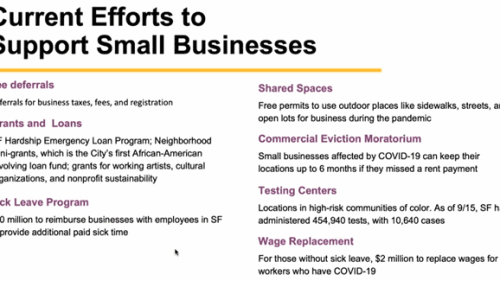Updated on June 11
Since 1936, ULI members’ shared knowledge, networks, and experience have guided the real estate industry through times of uncertainty and change. In the face of the current environment, ULI members are shaping the industry response to COVID-19 and charting the path forward. Now more than ever, stay up to date on the latest insights from your peers with this carefully curated list of links to featured member expertise.
- “[U.S.] Government measures have certainly been supportive of home prices and home sales during this crisis. If the fiscal stimulus is removed as scheduled at the end of July, aggregate spending will decline, which will result in an economic drag that could indirectly affect home buyers. When forbearance programs and foreclosure moratoria come to an end, we might see a surge of foreclosure activity,” says Brad Hunter, a managing director at RCLCO. Forbes: The Housing Market Is Rebounding, But What Happens After Stimulus Support Measures Fall Away? | June 11, 2020
- “The role of the office has not changed. Maybe the location may change, the design may change, but it is a place for collaboration, for innovation and creativity. … I can see the increasing flexibility in terms of work-life arrangements, but I have not met any individual with the aspiration to work from home for the rest of their career,” says Tim Wang, managing director and head of investment research for Clarion Partners. Axios: What Reopened Offices Will Look Like | May 28, 2020.
- “The ability to mentor younger employees, the spontaneous collaboration and creativity that occurs, and also the culture that companies develop, it’s very difficult to do it when we’re all on Zoom,” says Owen Thomas, CEO of Boston Properties and ULI Global Chair. CNBC’s Squawk Box: Work-from-home Won’t Replace Company Offices, Argues CEO Whose Tenants include Google and Snap | May 21, 2020.
- “Home builders are feeling much happier just in the last couple of weeks. Following a decline in sales of 50 percent to 60 percent (80 percent in some cases), many homebuilders are seeing a significant pickup in sales paces,” says Brad Hunter, a managing director at RCLCO. Forbes: Homebuilding Industry Preparing for a Strong Post-Virus Upswing: Opportunities and New Strategies | May 19, 2020
- Before the coronavirus crisis, “tenants were asking for more flexibility and service, but most landlords refused to give tenants what they wanted,” says Dror Poleg, author of Rethinking Real Estate and co-chair of ULI New York’s Real Estate Technoloy and Innovation Council. “Landlords will now be willing to take on more of this risk, because they simply no longer have a choice. When your building is suddenly 20% to 30% empty, you become much more openminded about a lot of things.” Bloomberg: Commercial Real Estate’s Survival Plan Looks a Lot Like WeWork | May 15, 2020
- “Most people were maybe expecting a V-shaped recovery [from the pandemic-driven downturn], but the uncertainty about the time frame for coming back means it might be shaped more like a Nike swoosh,” said CBRE Global Investors head of EMEA offices John Mulqueen. “But the positive is that when the market does come back, there will be pent-up demand for space and from investors.” Bisnow: What The Sentiment Of 2008 Can Teach Us About The 2020 Crisis | May 11, 2020
- “The impact is going to be on scheduling with a limited workforce,” said Steven Kline, vice president of Wyndmoor-based Regan Construction. “Project schedules are going to get extended…. The longer the project, the longer some of the overhead costs will accelerate or get larger.” Philadelphia Inquirer: Mired in the pandemic, construction pros consider the future of their business | May 7, 2020
- “The forced interaction of sharing doors and elevators has caused some anxiety,” Bob Youngentob, chief executive of EYA, said. “Townhomes, where you come in and out of your door, and you know you are the only one touching your door handle, provide some comfort.” New York Times: Coronavirus Crisis Threatens Push for Denser Housing | May 6, 2020
- “The core coworking model is being challenged as clients, many of whom are on short-term agreements of as little as 30 to 60 days, cease to use such facilities,” said Stephen A. Newbold, national director of office research, Colliers. “The greatest impact is likely to be on shared, rather than dedicated, space.” GlobeStreet: How COVID-19 Is Changing the Office Tenant-Landlord Relationship | April 20, 2020
- “Even when we come out of this, I don’t think anybody thinks we’re going to go right back to the normal way of working, even in our more traditional office environments. So why aren’t we starting to apply that to our changes and the adjusted protocol?” Nolan Finley talks with Eric Larson, CEO of Larson Realty, about the challenges of “reopening” the economy in Detroit and across the country. PBS One Detroit: Coping with the COVID-19 Crisis | April 15, 2020
- “The most lasting impact could come from firms reassessing their space needs and the flexibility of their lease agreements. If it is proven that some business functions can be run successfully through remote working, tenants may decide not to house such operations in their office space once we reach the new normal.” From Stephen Newbold, national director of office research for Colliers International, addresses potential impacts. Colliers International: COVID-19: Implications for U.S. Office Sector | April 14, 2020
- “Just when we were starting to trumpet the return of the entry-level home buyer, after years in which builders ignored that segment, we get another mind-bending recession. How will this affect home-buying and renting behavior?” Brad Hunter, managing director at RCLCO Real Estate Advisors, examines how the high-end and entry-level sectors of the new home market are getting hit in the market. Forbes: How Housing Choices For Millennials Could Change In A Post-Coronavirus World | April 7, 2020
- "[T]he U.S. real estate and construction industry is facing a new challenge created by the coronavirus crisis: a potential shutdown of the commercial lending and investment markets.” RCLCO director of strategic planning Charles Hewlett has said he is aware of deals that have fallen through due to concern about the near-term impact of the crisis, and he expects more to come. Construction Dive: Analysts predict a temporary coronavirus-related halt to commercial lending | April 3, 2020
- What are the implications for healthcare real estate? From corporate merger and acquisition activity to the healthcare industry’s demand curve, Stephen Newbold, national director of office research for Colliers International, addresses potential impacts. Colliers International: COVID-19: Implications for U.S. Healthcare Real Estate | April 2, 2020
- “As the Coronavirus (COVID-19) pandemic continues to expand throughout the Latin American borders, the real estate sector awaits cautiously and with two main questions: just how long will this last and how will it impact each sector?” Global Real Estate Institute chairman Henri Alster addresses how each real estate sector is being affected in Latin America and what the main worries are for the next couple of months. GRI Hub: Latin American Real Estate Prepares for COVID-19 Impact | April 1, 2020
- “The real estate industry is being clobbered by the coronavirus, and it’s going to get worse before it gets better,” writes Brad Hunter, managing director at RCLCO Real Estate Advisors. “The effects on real estate will vary by sector and market, and the extent of the effects will depend upon the duration of the economic shutdown.” Forbes, Coronavirus’ Impacts On Real Estate: Why You Need To Think Short-Term And Longer-Term | March 24, 2020
- “As COVID-19 spreads, the connection between health and our environment becomes increasingly clear. While there is still much that is unknown about this virus, there are immediate preventative steps those working across the real estate industry can take to reduce the risk of infection.” Joanna Frank, president and CEO of the Center for Active Design, addresses how the real estate industry can help reduce coronavirus transmission. Center for Active Design: 5 Ways to Optimize Buildings for COVID-19 Prevention | March 19, 2020




